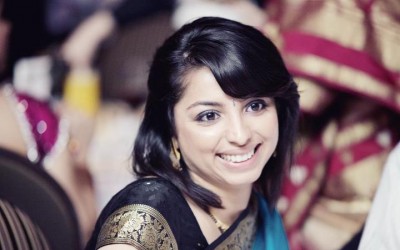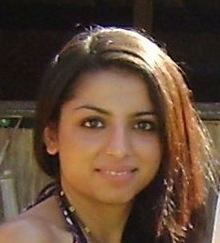By Anjali Joshi @TheresAnjali & online at: theadventuresofanewmom.com

Anjali Joshi, guest contributor
The minute I step through the large glass doors, the familiar scent of agarbhati greets me. I know my way around. I slip off my coat and shoes, and make my way up the stairs. My bare feet stick to the cold stone floor. I have been here hundreds of times, but never like this. Never alone.
The priest at the Mandir (temple) has begun his sermon. He speaks in English. Thank God, I think to myself. At least I’ll understand what he’s saying.
You see, I am white-washed. As much as I hate the use of the colloquial term, it is unfortunately the quickest way to describe me. I was raised in Canada by my immigrant Indian parents. They did everything to expose me to my culture, but very little of it stuck. I much preferred Hollywood movies to the four-hour Bollywood musical films. I chose ‘Western’ pop and R&B over Hindi tracks. And, despite the weekly Hindi classes, every question asked in Hindi by my parents was, much to their disappointment, answered in English.
I wasn’t the only one. I had met so many other first-generation Canadians growing up. We knew enough about our culture to answer questions, and nothing more.
It wasn’t until I got married and began thinking about starting a family of my own that I saw a problem with being so white-washed. So many questions flooded my mind, and the answers were nowhere to be found in the slew of books that flooded my bookshelf. Even Google failed.
How would I teach my children about Indian culture, their religion, and the language seeing that I knew so little myself? Would they still call themselves Indian? How important was it to preserve these traditions anyway? After some introspection, it was clear to me that it was important to me. Despite my being white-washed, I wasn’t ready to let go of it all. I wasn’t prepared to raise a child who was completely void of a cultural identity that includes his Indian heritage.
And, that’s how I found myself at the Mandir, climbing the steps alone. I spent every Sunday of my childhood there with my family. Always against my will. But, for the first time, I was here on my own accord. I didn’t know where else to start. The way I saw it, I was here to continue what my parents had started: understanding, accepting, and embracing my cultural identity as an Indian.
It has been nearly 2 years since I took those first steps towards a journey of self discovery. My weekly visits to the Mandir was just the beginning. Since then, I am asking the elders in our family questions about cultural practices, family traditions, and religious rituals. The Bhagavad Gita has found its way on my bookshelf. I am exposing my son to the different spices and flavours that are a part of Indian cuisine. And, he looks forward to the Hindi and Marathi songs his grandmothers sing to him over Skype.
The pregnancy books tell you about the many changes motherhood will bring on. After child-birth, expect to be a changed woman: physically, emotionally, and psychologically. And, then, there are the articles that tell you all the things that the pregnancy books don’t. But, no one told me about this. I never expected motherhood to ignite this journey to find my cultural identity. None the less, it is a pleasant surprise.
How has culture changed in your life since becoming a mom? Is it more or less important than it was before you had children? Share your thoughts with us!
About the author:

With a four-month-old in arms, Anjali and her husband relocated from Toronto to San Francisco. This teacher turned stay-at-home mom loves writing about her adventures in mommyhood with a pinch of humor and a bucket-load of love. Visit her blog at theadventuresofanewmom.com/ and follow her on Twitter @TheresAnjali



Your contribution to Masalamomma’s struck a chord, Anjali. I too experienced a similar upbringing, though influenced in part by being of mixed blood. Now that I live in a small town and have a son of my own, I too am trying to navigate the waters of cultural identity so that my son has some connection to his south asian roots. Would love to continue this dialogue with you and others.
Thanks, Sara! It was a pleasure to share my experience. As if parenting wasn’t daunting enough, the task of exposing your child to multiple cultures is certainly not an easy one!
What do you do to expose your son to his South Asian roots? I am always looking for creative ideas!
“I wasn’t prepared to raise a child who was completely void of a cultural identity.”
Perhaps you need to revise this sentence. If I moved to India and my son embraced the local Indian culture, is he devoid of cultural identity? Or just self-identifying as Indian? Sorry as it’s written, it sounds a bit condescending and belittling to the cultural identity that you have chosen for yourself.
I think what you are hinting at is the feeling of loss you have as you have fairly completely assimilated into your adopted culture. As someone who has a generational equivalent relationship with immigration as your son, I can speak with some authority that his interest in you parents birth culture will probably come fairly naturally.
You are absolutely right, Michael. I did mean to say, “I wasn’t prepared to raise a child who was completely void of a cultural identity that included his Indian heritage.” The change has been made. My intent was not at all to be condescending or belittling to the cultural identity I adapted. In fact, the ‘western’ influenced cultural identity is something I value greatly. The hope is that my Indian heritage will marry well with my existing cultural identity to create a unique and beautiful fusion!
Thank you for sharing your experience as a second generation American. It is comforting to know that my child will express interest in his parents’ birth culture naturally; but, like any other aspect of parenting, new parents are always fretting about whether or not they are doing a ‘good job’ of raising their kids. This is one of those things. I feel like I need to explicitly teach or expose him to our Indian heritage so that if there ever comes a point in his life he feels the need to reflect on his Indian roots, he has somewhere to start – just like I did.
Thanks for reading! There’s nothing I love more than a good discussion!
I love the ‘voice’ in your writing. I feel as if I was walking up the mandir steps with you – beautifully written. You have spoken the thoughts of many first generation Americans (or in your case, canadian) seeking to integrate their background with western traditions. I look forward to reading more from you!
Thank you, Joyeeta! I am glad the piece speaks to you. I know many of us go through the same challenges raising our children with both South Asian and Western values. It’s great to have a community like Masalamommas where we can connect with other moms like ourselves and share our experiences – trials, tribulations, and triumphs. Thanks for reading!